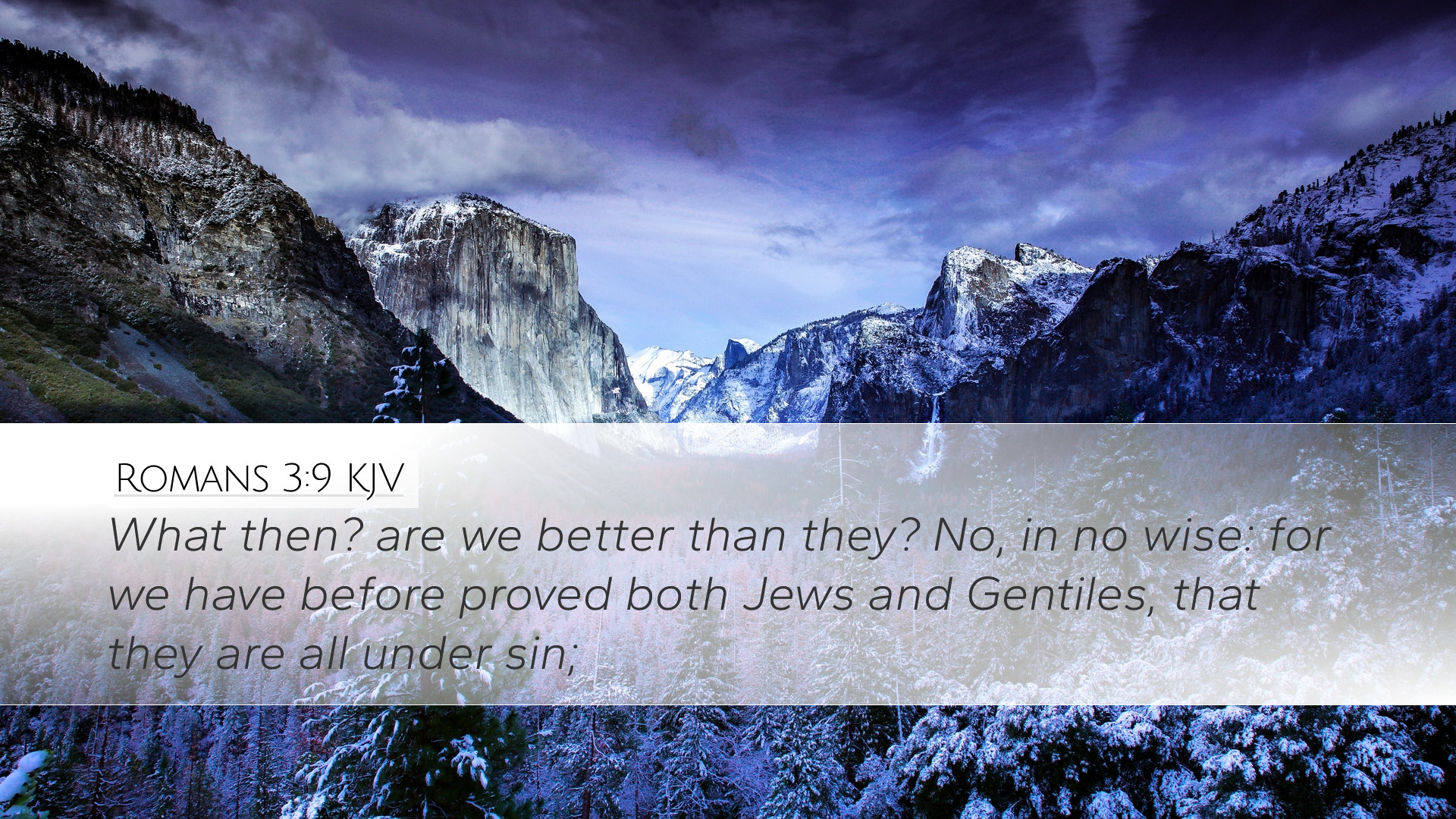Commentary on Romans 3:9
Romans 3:9 reads: "What then? Are we better than they? No, in no wise: for we have before proved both Jews and Gentiles, that they are all under sin."
Introduction
This verse presents a pivotal moment in the epistle to the Romans, where the Apostle Paul encapsulates the condition of humanity in relation to sin. The exploration of this text requires us to consider not only its theological implications but also its practical applications for believers and the church at large.
The Context
In this part of his letter, Paul addresses the moral state of both Jews and Gentiles, establishing the argument that all are equally in need of salvation. Understanding the broader context of Romans is essential: the Apostle is laying the groundwork for the doctrine of justification by faith, making it clear that no one can claim righteousness based on ethnicity or adherence to the Law.
Insights from Matthew Henry
Matthew Henry emphasizes the universality of sin, highlighting that all of humanity, regardless of background, stands guilty before God. He notes:
- Equality in Guilt: Henry stresses that both Jews, the chosen people of God, and Gentiles are equally under the weight of sin, debunking any notion of religious superiority.
- Purpose of the Law: He discusses how the Law reveals sin but cannot redeem, suggesting that its primary function is to highlight humanity's need for grace.
Insights from Albert Barnes
Albert Barnes provides a detailed exposition that contributes to our understanding of this verse. His commentary points to:
- Rhetorical Questions: Barnes notes Paul's use of rhetorical questioning to emphasize the futility of boasting in one’s heritage or law-keeping. The answer, "No," serves to reinforce that no one can claim a position of moral superiority.
- Universal Implication: He articulates that the phrase "under sin" signifies being under the dominion of sin, indicating a lack of righteousness and the natural state of all people who have not been redeemed.
Insights from Adam Clarke
Adam Clarke offers a nuanced interpretation, focusing on the pastoral implications of the text. His insights include:
- Jews vs. Gentiles: Clarke points out the cultural context where Jews considered themselves distinct and superior due to their covenantal relationship with God. Paul’s assertion dismantles this myth.
- Call to Humility: Clarke reminds readers that this realization should lead to humility and recognition of the grace offered through Jesus Christ rather than any assumed rights to righteousness.
Theological Implications
The theological ramifications of Romans 3:9 are profound. This verse underscores the doctrine of original sin, affirming that all humanity is implicated in sin due to the Fall. The implications for soteriology—particularly in understanding justification—are far-reaching, as it necessitates a move towards grace and faith as the only means of righteousness.
Application for Pastors and Theologians
This verse provides crucial groundwork for preaching on sin, grace, and redemption:
- Preaching Equality in Sin: Pastors must communicate that all stand in need of grace. This offers a unified ground for evangelism, as no individual or group holds an advantage before God.
- Exposing False Confidence: Clarke’s insights can help pastors warn their congregations against misplaced confidence in religious backgrounds, rituals, or adherence to law.
- Encouraging Humility: This text challenges the church to embrace humility, recognizing that all are saved by grace alone, and fosters an environment of grace and acceptance.
Conclusion
Romans 3:9 serves as a clarion call to acknowledge the universal predicament of sin while pointing toward the hope of salvation through faith in Jesus Christ. The combined insights from the commentaries of Matthew Henry, Albert Barnes, and Adam Clarke provide a rich tapestry of understanding that is invaluable for pastors, students, theologians, and Bible scholars alike.


